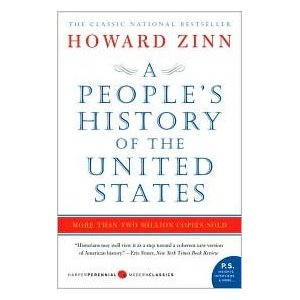The People’s History of the United States by Howard Zinn – Book Review

A theme is established at the beginning of the People’s History of the United States. It begins with Christopher Columbus enslaving, kidnapping and slaughtering the native Americans. It is continued with the African slave trade. It is represented by the protest of war after war, in countless labor strikes and the struggle of many different minority groups for equal consideration. Howard Zinn’s The People’s History is the repetitive recounting of the rich few subjugating the weak majority in the name of democracy, capitalism and freedom.
According to Mr. Zinn, this book was written to look at the history of the United States not from the point of view of presidents, senators and founding fathers but instead from the eyes of native Americans, slaves, share croppers, the working class and women of all walks of life. I believe that he accomplished this goal. However, either by necessity or biased opinion it is also critical of America beyond any point of redemption. It is hard for me to imagine how the wrongs described in this book could be righted and still call the results America for there wasn’t much said about America that was positive.
I am completely in agreement with him when he says that there is no such thing as pure history. All history is told through the eyes and prejudices of the historian. This is carried out by the choices of inclusion and omission. This is a feature of not only every history book but every piece of written word. History is a weapon whether its aims are to instill patriotism or to incite riots. It’s funny how depending on ones station in life the connotation of either may be negative or positive.
Over and over again I read chronicles of people fighting oppression against all odds and paying the ultimate price. Depressingly, most of it was seemingly for naught. Most of the people who fought injustice did not live to see the results of their work. I learned that justice is not something that begins at the ballot box, nor the house of representatives, nor any court of law. The abolishment of slavery, the right to vote, education for all, child labor laws, the minimum wage and hundreds of other privileges that we consider our birthright were not initiated by any of those institutions. They were achieved by ordinary people protesting over a prolonged period of time. It took people willing to give up their own freedom and often their lives in hopes of improving the lives of those that would come after them.
I’ll not try to recount the contents of this book as I don’t feel that I am capable but I will say that reading this book was emotionally draining. I felt a wide range of emotions as I read: pride, outrage, pity, denial but ultimately shame. I was forced to admit to myself that no matter what Mr. Zinn’s intentions for writing it, I believed almost all of it to be true. I also recognized my complicity in the state of the world that I live in and my unwillingness to take any action.
We now live in a world where 1% of the population of our country owns 90% of the wealth. The rich expect the rest of us to subsidize their extravagant lives and most of us are not only willing servants but outspoken apologists for our masters. Some like myself are well taken care of. With such a lifestyle its hard to complain, it is likewise hard live with myself as people starve all over the world. Yes, history is a weapon and it has been used to teach me that I am a true blue, apple pie American and I deserve prosperity more than the rest of the world.